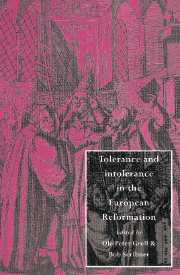Book contents
- Frontmatter
- Contents
- List of contributors
- Preface
- Dedication
- 1 Introduction
- 2 The travail of tolerance: containing chaos in early modern Europe
- 3 Preconditions of tolerance and intolerance in sixteenth-century Germany
- 4 Heresy executions in Reformation Europe, 1520–1565
- 5 Un roi, une loi, deux fois: parameters for the history of Catholic-Reformed co-existence in France, 1555–1685
- 6 Confession, conscience and honour: the limits of magisterial tolerance in sixteenth-century Strassburg
- 7 One Reformation or many? Protestant identities in the later Reformation in Germany
- 8 Toleration in the early Swiss Reformation: the art and politics of Niklaus Manuel of Berne
- 9 Tolerance and intolerance in sixteenth-century Basle
- 10 Exile and tolerance
- 11 The politics of toleration in the Free Netherlands, 1572–1620
- 12 Archbishop Cranmer: concord and tolerance in a changing Church
- 13 Toleration for Catholics in the Puritan revolution
- 14 The question of tolerance in Bohemia and Moravia in the age of the Reformation
- 15 Tolerance and intolerance in sixteenth-century Hungary
- 16 Protestant confessionalisation in the towns of Royal Prussia and the practice of religious toleration in Poland-Lithuania
- Index
11 - The politics of toleration in the Free Netherlands, 1572–1620
Published online by Cambridge University Press: 07 December 2009
- Frontmatter
- Contents
- List of contributors
- Preface
- Dedication
- 1 Introduction
- 2 The travail of tolerance: containing chaos in early modern Europe
- 3 Preconditions of tolerance and intolerance in sixteenth-century Germany
- 4 Heresy executions in Reformation Europe, 1520–1565
- 5 Un roi, une loi, deux fois: parameters for the history of Catholic-Reformed co-existence in France, 1555–1685
- 6 Confession, conscience and honour: the limits of magisterial tolerance in sixteenth-century Strassburg
- 7 One Reformation or many? Protestant identities in the later Reformation in Germany
- 8 Toleration in the early Swiss Reformation: the art and politics of Niklaus Manuel of Berne
- 9 Tolerance and intolerance in sixteenth-century Basle
- 10 Exile and tolerance
- 11 The politics of toleration in the Free Netherlands, 1572–1620
- 12 Archbishop Cranmer: concord and tolerance in a changing Church
- 13 Toleration for Catholics in the Puritan revolution
- 14 The question of tolerance in Bohemia and Moravia in the age of the Reformation
- 15 Tolerance and intolerance in sixteenth-century Hungary
- 16 Protestant confessionalisation in the towns of Royal Prussia and the practice of religious toleration in Poland-Lithuania
- Index
Summary
That the seventeenth-century Dutch Republic was a haven of toleration has become almost axiomatic in literature on the Dutch Golden Age. Indeed, this is one fact on which both modern scholars and contemporary commentators can be expected to agree. To an interested observer like Sir William Temple, a sage and discriminating commentator on Dutch society in the later part of the seventeenth century, the benign treatment of religious minorities was an important aspect of the peculiarity of the Dutch as their system of government, their efficient engrossment of the world's trade, and the freedom accorded their women in public places. ‘The great care of this state’, he wrote in his justly famous Observations upon the United Provinces of the Netherlands,
has ever been, to favour no particular or curious Inquisition into the faith or religious principles of any peaceable man, who came to live under the protection of their laws, and to suffer no violence or oppression upon any man's conscience whose opinions broke not out into expressions or actions of ill consequence to the state… It is hardly to be imagined how all violence and sharpness which accompanies the difference of Religion in other countries, seems to be appeased or softened here, by the general freedom which all men enjoy.
Temple wrote in 1673, a full century after the foundation of the new free state, but other earlier English travellers commented in much the same way: all appeared fascinated and curious at the way in which persons of different faiths coexisted in the Netherlands, in defiance of the conventional wisdom that the unity and security of a state demanded unity in one faith.
- Type
- Chapter
- Information
- Tolerance and Intolerance in the European Reformation , pp. 182 - 198Publisher: Cambridge University PressPrint publication year: 1996
- 21
- Cited by



